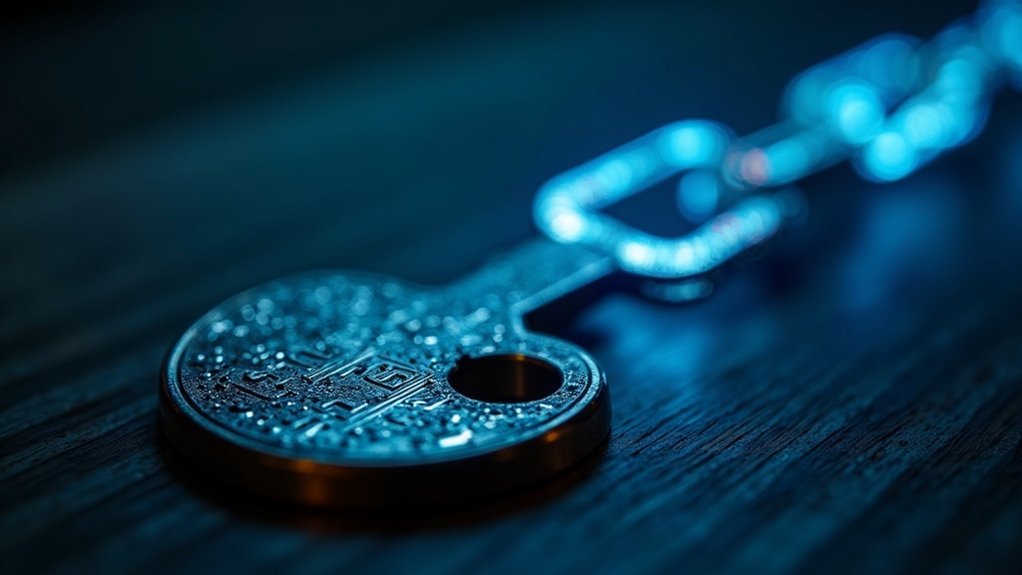Decentralized wallets operate on cryptographic keys – public ones for receiving funds, private ones for access. No middlemen required. Users control their own digital assets through these self-custody tools, signing transactions directly on the blockchain. They connect to DeFi protocols, enabling lending, staking, and trading without banks or brokers. Security features include seed phrases and biometric verification. Cold storage options exist for the paranoid. Financial freedom comes with responsibility – lose your keys, lose your crypto.
The digital revolution has a new hero – the decentralized wallet. It’s not just another tech gimmick. It’s the backbone of crypto freedom. These wallets operate using a pair of cryptographic keys: private and public. The private key is yours alone, a secret code that reveals your digital fortune. The public key? That’s your digital address where others send funds. Simple stuff, really.
When you want to move crypto, you sign transactions with your private key. No middleman required. Your signed transaction gets broadcast to the blockchain network, where miners or validators confirm it’s legit. Once validated, it’s permanent. Written in digital stone. And just like that, peer-to-peer value transfer happens without banks getting their cut.
Security matters. A lot. Decentralized wallets pack features like seed phrases, two-factor authentication, and sometimes biometric verification. Lose your device? No problem. Your seed phrase—typically 12 or 24 random words—resurrects your wallet on any compatible device. Pretty neat trick. These wallets support multiple blockchains simultaneously, allowing seamless management of various cryptocurrencies.
The non-custodial nature is what makes these wallets revolutionary. You control the keys. You control the funds. No third party can freeze your assets or decide what you do with them. Your money, your rules. Even if the wallet provider vanishes tomorrow, your funds remain accessible. That’s power.
Financial freedom isn’t granted—it’s seized. Control your keys, control your destiny.
These wallets serve as gateways to the wild west of decentralized finance. DeFi protocols worth billions rely on them. Lending, staking, trading—all possible without middlemen taking a cut. Just you and some smart contracts doing business. Unlike custodial alternatives, these wallets offer enhanced protection against breaches since your keys never reside on centralized servers. The lower transaction fees make these wallets even more attractive as they eliminate the need for intermediaries in the transaction process.
Hot wallets stay connected to the internet for convenience. Cold wallets keep your keys offline for better security. Choose your poison.
Either way, decentralized wallets represent a fundamental shift in how we think about money and ownership in the digital age. No permission needed. No account applications. Just pure, unadulterated financial autonomy. And in today’s world, that’s something worth having.
Frequently Asked Questions
How Secure Are Decentralized Wallets Compared to Custodial Ones?
Decentralized wallets offer better security against mass hacks and regulatory interference, but they’re not foolproof.
No third party can freeze assets or steal your keys—nice. The trade-off? You’re completely responsible. Lose your seed phrase? Tough luck. Funds gone forever.
Meanwhile, custodial wallets provide recovery options and insurance but remain juicy targets for hackers.
They’re also subject to regulatory freezes. Your keys, your crypto. Someone else’s keys? Not really your crypto.
Can I Recover My Wallet if I Lose My Private Keys?
No. If private keys are lost, funds are typically gone forever.
That’s the harsh reality of decentralized wallets. No company to call, no support ticket to file.
Approximately $140 billion in Bitcoin sits in this digital purgatory – inaccessible due to lost keys.
Some advanced recovery options exist: social recovery schemes, MPC wallets, or encrypted backups.
But without a proper backup method already in place? Those coins are as good as buried in digital concrete.
What Fees Are Associated With Using Decentralized Wallets?
Decentralized wallets don’t charge fees themselves. The fees come from the blockchain networks.
Network fees go to miners/validators who process transactions—higher congestion, higher fees. Simple.
Different blockchains charge differently: Bitcoin uses byte size, Ethereum uses gas.
Then there’s exchange fees when swapping tokens on DEXs.
Want cheaper transactions? Try off-peak hours or Layer 2 solutions. Some networks are just cheaper than others. That’s crypto for you.
Are Decentralized Wallets Suitable for Beginners in Crypto?
Decentralized wallets aren’t ideal for crypto beginners. They demand technical know-how and personal responsibility that newbies often lack.
One wrong move? Your funds vanish forever. No customer service hotline to bail you out.
While interfaces have improved, the learning curve remains steep. Cold wallets offer better security but require additional setup knowledge.
Hot wallets are convenient but riskier. Most beginners would be better served starting with user-friendly centralized options before diving into self-custody.
How Do Decentralized Wallets Handle Cross-Chain Transactions?
Decentralized wallets don’t handle cross-chain transactions directly. They rely on bridge protocols.
Users lock assets on the original blockchain and receive wrapped tokens on the destination chain. It’s not magic – just smart contracts doing their thing.
When you want your original assets back? Burn those wrapped tokens. The locked assets get released. Simple, really.
These bridges maintain the vital 1:1 peg between original and wrapped assets. No double-spending allowed.








